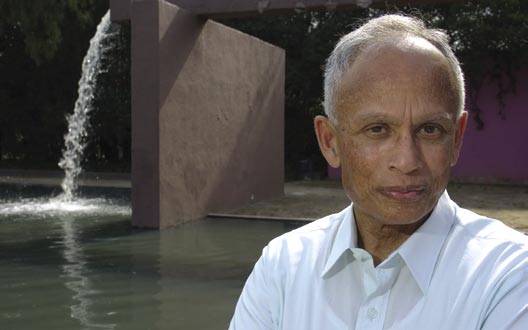
WATER FRONT | May, 2006
On August 24, during the World Water Week in Stockholm, Professor Asit K. Biswas will receive the 2006 Stockholm Water Prize from the hands of HRH Crown Princess Victoria of Sweden. The Prize marks a high water mark – one of many during his long and distinguished career – for this most worldly of citizens.
Born in Bangladesh, raised in India, educated in Canada (where he holds citizenship) and with a global operation based out of Mexico and Spain, Professor Biswas through his life’s work truly embodies the “outstanding achievements” the Stockholm Water Prize was founded to honour.
On the eve of this year’s Water Week, Stockholm Water Front took time out to ask the distinguished professor several questions and gain even greater insight on this great man.
Professor Biswas, what does receiving Stockholm Water Prize mean to you?
This year I received the prestigious Aragon Environment Prize of Spain, and “Man of the Year” Award from Prime Minister Harper of Canada for my work in the area of international development. However, in the field of water, the Stockholm Water Prize is unique and the most respected in the world. The Stockholm Water Prize and the other two prizes I received are really a confirmation by the global community of the quality of work at our Third World Centre for Water Management and its overall impacts on the world. Naturally, we are delighted with such global recognitions.
How would you describe yourself?
I see myself primarily as a scientist who wants to ensure that the best water policies are formulated and implemented in specific countries, based on the countries’ aspirations and conditions to improve the quality of life of their people. I do not care much for political correctness, international bandwagons, dogmatic views and hidden agendas. I have no problem to call a spade a spade. I firmly believe that science does not advance by consensus: if it did, we still would be living in the Dark Ages! Thus, candid discussions of complex problems are absolutely essential.
For nearly 40 years, you have challenged the Western solutions in solving water problems in the developing world. Why are such solutions fundamentally not appropriate?
The world is highly heterogeneous. Countries are at different stages of development. Climatic, economic, social, cultural, legal and environmental conditions are different. Technical and management capacities of institutions are different. Levels of corruption are different. All these factors change with time. By neglecting these considerations, the solutions proposed by Western experts and bilateral and multilateral aid institutions have often created more problems than they have solved. We need to develop specific solutions for specific problems for specific locations. In the field of water, one size does not fit all. There is no universal paradigm. If we are to ensure a water-secure world for the future, we have to consider existence of plurality of paradigms for both the North and the South. What works in Sweden may not work in Singapore or Syria, and vice versa. In addition, the South can teach many countries in the North better management practices, a fact that is being ignored at present. For example, Singapore can teach the entire Western World as to how to manage their urban water and wastewater management systems more efficiently and equitably.